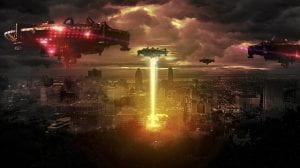Some argue it is a glimpse into the future, while others dismiss it entirely.
Science fiction not only explores the world’s many possibilities, including dystopian worlds, utopian societies, and a variety of other futuristic ideas, it also brings them to life. When you read science fiction, you will get a sense of what could happen if the planet goes south or becomes highly developed. Science fiction is essential in society because it focuses on the “what if’s” in life and builds the audience a sense of suspense, curiosity, and wonder about science fictions many topics. Science Fiction is more important than you’d think. Wouldn’t it be nice to know what your future holds?
Suspense, wonder, and curiosity are all elements of science fiction. Several science fiction topics are based on real-world issues or circumstances. Harrison Bergeron is a great illustration of this. The narrative is about equality and how “everyone should be equal,” but the costs of having everyone equal aren’t always worth it. Some examples throughout the story are the use of handicaps which were to be sure that nobody can have advantages over another, the brain shocks that George gets due to intelligence (1), and that ballet dancers all need to wear masks in order to “conceal their beauty” (10). Equality is one of the most pressing issues that people face in the actual world; what if this is the result? It’s something you’d never imagine unless you’ve been paying attention to these kinds of issues covered in science fiction.
How will we know what to do if something went wrong in the world?
There are various pieces of science fiction that concentrate on the world’s descent into chaos. Science fiction writers spend a lot of time talking about how the planet is breaking down and becoming uninhabitable. These sections are dystopia, environmentalism, and wastelands. Dystopian societies are often explained as post-apocalyptic, undesirable, and shown to have great suffering and injustice. In science fiction, dystopian societies are shown repeatedly. Often these societies occur due to government control, technological control, environmental destruction, and survival. Environmentalism relates to natural disasters and possibilities about what can happen to the world in the future. With the world today, the environmentalism part about science fiction can show many relations to global warming to create even more awareness, which can be highly effective. Wasteland worlds can be described as a place is ready for new beginnings after disastrous times. These wastelands are commonly caused by destruction of war, destruction of nature, and destruction by disease.

This relates to today’s world as we are in a state of destruction by disease. These sections of science fiction draw attention to problems in the world that many people are beginning to dismiss; if people took the time to read science fiction, a sense of fear could appear so change can be made.

And last, moving away from the idea of the world collapsing and turning into an inhabitable place, science fiction provides a glimpse into a world that is advanced in a way that it can be considered “perfect”. This advanced place is explained by a utopian society. This part of science fiction allows readers and/or viewers to see again, what is possible in the future. Utopian societies are defined by a community or society that possesses highly desirable or nearly perfect qualities for its citizens. An example of this is the community of Twin Oaks. Twin Oaks is a small community that comes together and shares the same beliefs about cooperation, sharing, non-violence, equality, and ecology. This is an illustration of a utopian society in which everyone lives in harmony. These communities may exist in the future, and science fiction brings various perspectives on them to life.
In conclusion, with the points stated you can see that science fiction is beneficial to readers in the sense that it brings some knowledge to the possibilities of the future. You can get an idea what is possible relating to apocalyptic societies, utopian societies, and all kinds of other futuristic concepts. Real-world problems will be used by science fiction writers to construct potential outcomes. In terms of these real-world issues, it is an important genre to pay more attention to, especially now with all of the uncertainty in the world. As a result, readers from all over should pay attention to the information provided by science fiction rather than dismissing it before these problems manifest themselves in actual life.






